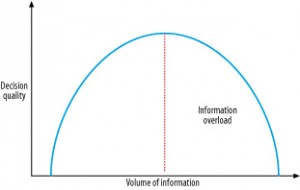Information density: Weakness or strength?
Are you hitting the right level of information density in your writing?
“Often white papers on technical subjects written for an executive audience have…too much technical detail,” says Robert Bly in The White Paper Marketing Handbook: How to Generate More Leads and Sales with White Papers, Special Reports, Booklets, and CDs (p.16.) Bly’s comment made me think about pieces written by portfolio managers and other financial experts. Their enthusiasm for their topic often gets them bogged down in details.
Benefits first, details later
If you’re a financial professional, remember to focus first on the benefit of your expertise to your readers. Then, you can delve into the details.
Not sure if you have too much detail? Ask an objective member of your target audience for feedback.
Too little data can also hurt
Meanwhile, remember that an absence of detail can also handicap your white paper by undercutting your credibility. As Bly says, often “…white papers written for engineers and scientists have too low an information density (they are too superficial).”
Imagine, for example, you’re trying to sell a new trading system to an investment management system. The president of your prospect company will seek information differently from the company’s head of information technology.
You need to know your audience before you start writing, so you can tailor communications to them.


